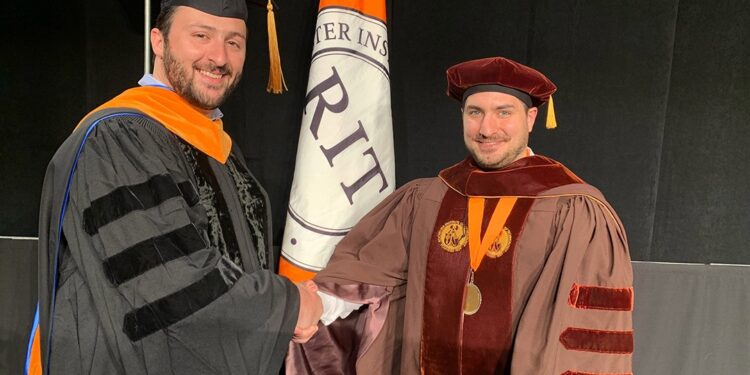[ad_1]
Dimitris Chachlakis turned the primary scholar to be awarded the brand new Ph.D. in electrical and laptop engineering this Could from Rochester Institute of Expertise.
The brand new diploma, not too long ago authorised by the New York State Division of Training, builds upon the Ph.D. in engineering, a multi-disciplinary diploma established a number of years in the past, and since then refined into three distinct applications. Chachlakis transitioned into the brand new diploma program and centered research on the trending space of multi-modal tensor information analytics and machine studying.
“The Ph.D. in engineering was beneficial to me by my adviser,” mentioned Chachlakis, who got here to RIT from the Technical College of Crete, Greece. “Entering into this system, I used to be uncovered to numerous disciplines and discovered how one can collaborate. Historical past has proven that when folks come collectively from the completely different disciplines, you’ll be able to see that all of them can accomplish a lot extra.”
That collaboration included duties as a analysis assistant within the MILOS Lab within the Kate Gleason School of Engineering, and as co-author of a number of papers for peer-reviewed journals within the space of sign processing and machine studying. In his doctoral dissertation he proposed new concept for the joint evaluation of knowledge from a number of sources, primarily based on L1 Norm formulations.
“We try to develop new basic concept, relevant in something in science and engineering that depend on information processing,” mentioned Chachlakis. “The L1 norm is mainly a brand new formulation for taking the multi-dimensional array, also called a tensor, and analyzing it into important elements whereas suppressing information corruption and noise. And tensors are ideally suited information buildings for capturing inter-dependencies throughout the size.”
Tensors can be utilized for information evaluation and evaluation, particularly to refine how large information units from a number of sources will be greatest assessed and be certain that the knowledge is dependable. That reliability is crucial for purposes utilizing laptop imaginative and prescient, or enhancing MRI know-how in well being care, for instance.
The three new doctoral applications are an evolution and substitute of the Ph.D. in engineering, a level program established by RIT’s engineering faculty in 2014. The foundations of this system have been its multidisciplinary have a look at drawback fixing and its emphasis in assembly calls for primarily based on nationwide initiatives from the U.S. Departments of Labor, Vitality, Transportation and Well being and Human Providers. This system had eight college students enrolled in its first yr and had expanded to 90 by 2020.
The foundations of that Ph.D. in engineering haven’t modified, and have been completely built-in into 4 separate areas with related disciplines: electrical and laptop engineering, mechanical and industrial engineering, and biomedical and chemical engineering—and the main focus stays on utilizing a multidisciplinary strategy to fixing right now’s world issues.
College students within the unique doctoral program have been supplied the choice to finish coursework in this system or transition to one of many new doctoral applications. Chachlakis selected the latter, and in spring, defended his dissertation, titled “Idea and Algorithms for Dependable Multimodal Information Evaluation, Machine Studying and Sign Processing.”
Chachlakis began at his new job at Digimarc just about only a few days after commencement. He intends to maneuver to the corporate headquarters in Oregon towards the tip of summer time. The corporate is greatest recognized for its digital watermarking know-how, and Chachlakis might be a part of its engineering R&D group.
“This might be my first job after incomes the Ph.D. and I’m anticipating that that is going to be satisfying, and in addition the group that I’m going to affix, I really feel like they’ve a noble trigger—that makes me really feel even higher about it,” he mentioned. “I really feel like I’m contributing to society by working and enhancing the know-how they have already got. After I was doing my undergraduate work, I actually didn’t have a plan of what I used to be going to do subsequent. On reflection, I’d do the Ph.D. once more a thousand occasions over. It was difficult, not solely due to the workload and the dedication, however transferring to a brand new nation on my own. Fortunately, RIT welcomed me, and made the transition a lot simpler. I really feel I’ve discovered a lot throughout my Ph.D. research, and I feel that’s invaluable.”
[ad_2]
Source link









